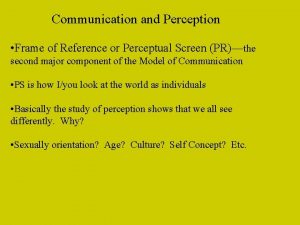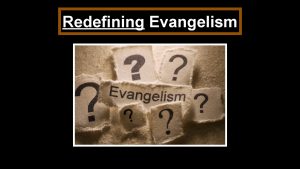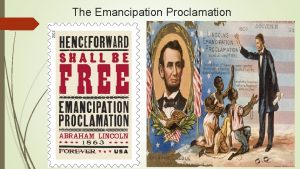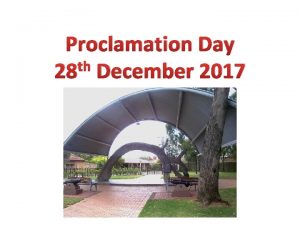Screens Technology and Evangelism PROCLAMATION VS PERSONAL EVANGELISM













- Slides: 13

Screens, Technology and Evangelism

PROCLAMATION VS. PERSONAL EVANGELISM


Cultural Challenges to Evangelism • Our ears are in large part closed to proclamation evangelism because: 1. We live in a world with multiple “truths” fueled by a social media world that advocates all “truths” to be considered equal and valid, even if they directly oppose other espoused truths. 2. The proliferation of “fake news” makes us very wary of anyone bold enough to suggest the possibility of absolute truths.

Cultural Challenges to Evangelism • Our hearts that are relationally conflicted in light of personal evangelism because: 1. Virtually relating with people can create a false sense of relational connectedness. 2. The real meat of personal evangelism exists in the world beyond online relationality - an exchange of self that is impossible without being embodied in each other’s presence.

Given ears deafened to proclamation and hearts that are relationally conflicted as a result of technological shifts, what does evangelism look like in 2019?

Evangelism in 2019 • “Entering into other people’s worlds with Christlikeness is essential to the church’s walk in the 21 st century. However, our evangelistic efforts often lead to failure simply because we fail to look like the Christ we are proclaiming”. (John Stott) • Incarnational evangelism describes evangelism that seeks to reveal the good news of Jesus as it is somehow embodied or lived out in real time in the presence of those yet to follow Jesus.

• “After this, Jesus went out and saw a tax collector by the name of Levi sitting at his tax booth. “Follow me, ” Jesus said to him, and Levi got up, left everything and followed him. Then Levi held a great banquet for Jesus at his house, and a large crowd of tax collectors and others were eating with them. But the Pharisees and the teachers of the law who belonged to their sect complained to his disciples, “Why do you eat and drink with tax collectors and sinners? ” Jesus answered them, “It is not the healthy who need a doctor, but the sick. I have not come to call the righteous, but sinners to repentance. ” (Luke 5: 27 -29)

• After encountering Jesus, what is the first thing that Levi did? • He “got up, left everything and followed [Jesus]”. • Where did Jesus encounter Levi? • At his booth, at work. • After experiencing this drastic public change, what did Levi next do? • He threw a party for Jesus at his house and invited all of his friends – the infamous tax collectors and sinners. • Levi immediately desired to embody the good news of Jesus in relationship with his friends as a way to bring them one-step closer to Jesus.

• The Pharisees’ responded by complaining that Jesus and His followers were relating to sinners inappropriately. Asking the wrong question • How can I change others with my message so God can love them? Asking the right question • How can I love sinners so God can change them?

How then does one bring the good news of Jesus to another person in 2019? • Proclamation evangelism likely becomes 1 b approach to evangelism, while our 1 a approach becomes incarnational evangelism. • Though we might utilize social media to initiate something, we must be quickly ready to move beyond virtual relating and into incarnational relating. • What might it look like for us to become a people who regularly throw “Matthew parties” where we assemble our friends – both followers of Jesus and otherwise – and seek out one step closer to Jesus opportunities?

• Jesus made a profound statement in John 13: 35 saying “everyone will know that you are my disciples, if you love one another”. • Our love for each other is not going to primarily be made evident through others creeping our Twitter or Snapchat feeds; our love will be seen as others are exposed to our interpersonal relationships within the church. Love must be embodied to truly be understood.

A Conclusion • We get to be the ones privileged to share with others this incredibly good news, but we must do so incarnationally, embodying the message, so that we might share it naturally and poignantly in meaningful, loving relationships with those yet to follow Jesus. • A challenge - might we become a people who are known more for our incarnational evangelism than we are for our online profile and might we be a people who relationally proclaim that truly all our hope is in Jesus.
 Personal evangelism pathfinder honor
Personal evangelism pathfinder honor Effective personal evangelism techniques
Effective personal evangelism techniques Polywedge screen panels
Polywedge screen panels Serp.louisiana.doe
Serp.louisiana.doe Brigance test for 3 year old results
Brigance test for 3 year old results User interface design for atm screens
User interface design for atm screens Hailstop hail guard netting
Hailstop hail guard netting Frame of reference communication
Frame of reference communication Edward gordon craig screens
Edward gordon craig screens Revolving screens
Revolving screens Kenneth burke terministic screens
Kenneth burke terministic screens Aabe ethiopia website
Aabe ethiopia website Proclamation of amnesty and reconstruction apush
Proclamation of amnesty and reconstruction apush Dunmore proclamation
Dunmore proclamation

























